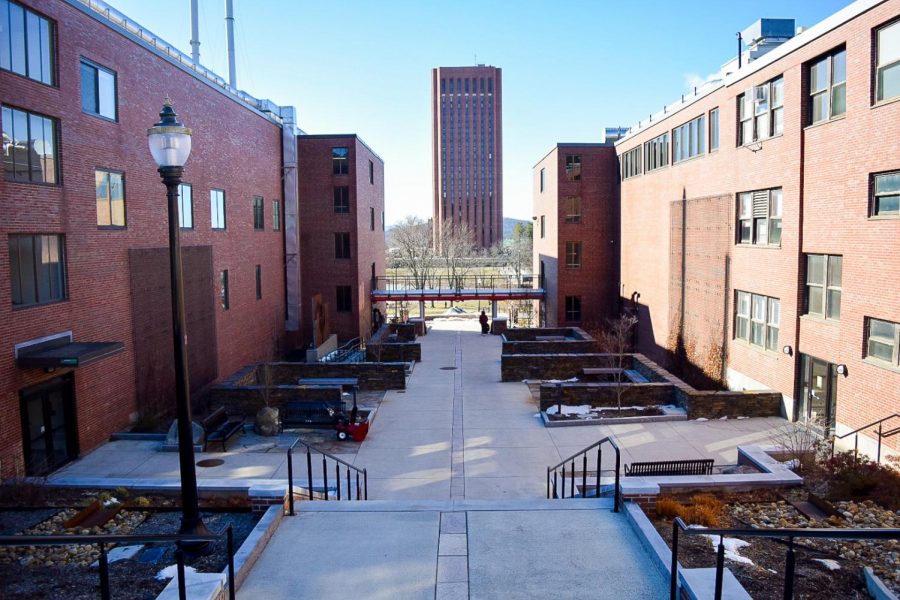A recent Racial Justice Coalition initiative to add a social justice general education requirement gained traction after the Student Government Association voted to endorse it last Wednesday at its senate meeting. The SGA plans to push for the gen-ed to be implemented for the freshman entering in the fall of 2022.
The idea was introduced to the UMass administrators back in July, when RJC and UMass for Black Lives submitted a list of demands to the University to promote racial equality. Among this list was the demand that a social justice gen-ed be added to the University requirements to “provide students with an understanding of institutional inequalities within the world, the U.S., and UMass,” reads the list of demands.
Before the University can implement the gen-ed, it has to be voted on by the Faculty Senate. “When it comes to gen-eds, or anything that involves the dean of students, everything has to go through the faculty senate,” said Jennie Chang, the vice president of the SGA. “The Faculty Senate has all the power.” The SGA has not yet set a date to present to the faculty senate.
The SGA presented the gen-ed to the faculty senate once before, in December, but that presentation was solely to put it on the senate’s radar. “The first presentation was to loop them in and get feedback,” said SGA President Sonya Epstein, who noted that the next time that the SGA presents the gen-ed, it will be more formal, “in the form of/accompanied by a motion.”
The SGA and the RJC are also trying to gauge the support of the UMass community for the gen-ed. “The next step is getting more support from more professors and even from other students,” Chang said. The RJC and SGA have a survey available for students to share their thoughts on the initiative.
“It would give students a lens into the world of minorities,” said Zach Steward, a junior African American studies and legal studies major. “Obviously they wouldn’t be able to understand everything that minorities on campus go for, but they would hopefully be able to build empathy for their fellow students, faculty and staff, and then actually try to push for a change, not just on campus, but once they graduate.”
Chang also expressed her support for the motion. “I think it would bring a lot of value to a UMass education,” she said. “I think that Massachusetts likes to claim that they’re very progressive and liberal and welcoming to underrepresented and marginalized community members, but as a woman and a person of color, that’s not my lived experience here.”
Some students also expressed concerns about the implications of adding another gen-ed requirement. One of these concerns related to STEM majors and their schedules.
“STEM majors have a very rigorous and in most cases lock step curriculum and the addition of a stand-alone course to these programs would create issues for timely degree completion,” said Kyle Kendall, the chair of the administrative affairs committee in an email regarding a proposed meeting to address concerns about the gen-ed requirement.
“In these instances, most if not all programs have a field specific course that is meant to cover social issues as well as diversity as it is seen and applies to the major however almost all fall very short of what many including myself believe should be covered as it pertains to social justice,” he said.
Epstein also acknowledged this concern, saying, “we do understand that it is another gen-ed, and it might be a bit more difficult for some majors to implement it just because they have more rigorous structures.
“But we are really dedicated to working with those departments, with those advisors, to see how can we assure that students have the flexibility to add this one really essential gen-ed.”
Steward also shared his view on the gen-ed in relation to STEM majors, “If you’re a STEM major, yeah, by and large you deal with numbers and data and all that, but you also deal with minorities,” he said. “If this can help you have better interactions with people when you’re doing whatever job you choose to do, than I would say do it.”
Another concern that Kendall expressed pertained to the cost of developing a new gen-ed. “Creating an additional course requirement directly increases the cost of a student’s education, and as such may be a reason that an individual is not able to complete their degree,” he wrote in the same email. “This also has potential to affect financial aid, grants, and scholarships that may not be able to cover the cost of the program. This situation goes against several motions that the SGA has voted in favor for as well as the work that other organizations on campus to reduce the cost of education.”
Epstein said that the SGA has considered the financial aspect of the initiative, and that they have been looking into grants to help cover the costs of adding a new gen-ed.
According to Epstein, some students have suggested revising the United States diversity and global diversity requirements instead of adding a new one. The faculty senate revised these requirements in 2017. “Clearly, even with revisions to those existing requirements, they’re so different from this one that we are proposing,” Epstein said.
“I think it’s a way for students who wouldn’t normally take that class to take it. But also, it’s a way for students who may not necessarily interact with each other to talk about topics surrounding social justice,” Steward said. “I guess my end goal would be to have these discussions start in the classroom but then foster them and build upon them well enough that they can continue to have these discussions with their family members and with their friends.”
Sophia Gardner can be reached at [email protected]. Follow her on Twitter @sophieegardnerr.




















